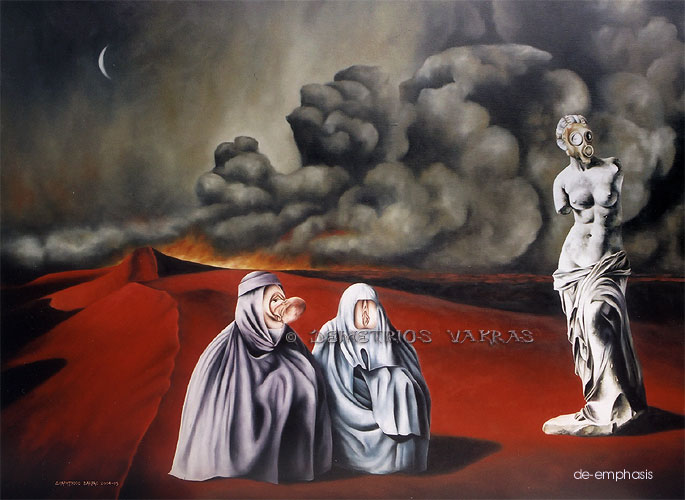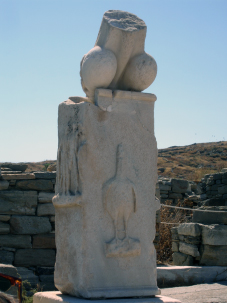|
|
essay by Demetrios Vakras
islam: The carnal faith
SYRIAN CHRONICLES
“… Muhammad’s conception of Paradise, it is sensual and crude in the extreme. He envisages food and drink, copulation with glamorous courtesans, beds of gold to lie upon … Muhammad emancipates the man and permits him legally to marry as many freeborn women as he wishes – and he is permitted as many concubines as he can cope with.”
Text no. 13: Dionysius Reconstituted, sections 28 & 29, p. 132, The Seventh Century in the West-Syrian Chronicles, translated by Sebastian Brock, ISBN 0853232385
“… the Arabs … first king [was] a man of their own number whose name was Muhammad … [He] provided them with the kind of laws they desired, they called him Prophet and Messenger of God. They are a very libidinous and carnal people, and any law framed (by) Muhammad or by some God-fearing person which is not framed to appease their own desires they have ignored and set aside.”
Text no. 10: The Chronicle of Muhammad’s , AD 775, p. 56, The Seventh Century in the West-Syrian Chronicles, translated by Sebastian Brock, ISBN 0853232385
BYZANTINE CHRONICLES
“Ishamelites are indeed dominated by Dionysos and Eros; they indulge readily in every kind of sexual licence, and if they are circumcised in the flesh they are certainly not so in their passions. In fact, the Ishmaelites are nothing more than slaves – trebly slave – of the vices of Aphrodite.”
Anna Komnena, Book 10, section v of The Alexiad, p. 310 E.R.A. Sewter translation (Penguin) ISBN 0140442154.

de-emphasis. 2004-05. Oil on canvas. 1015x1375 mm. Original drawing started 1/5/2004, finished 3/5/2004.
The carnal nature of Islam has been commented on by those whose proximity to Muslims has caused them to suffer Islamic predation. The prescient observations of the Syrians and Greeks (Byzantines) are as valid today as they were when they were made 1000–1300 years ago. Islam is a religion for males. In this religion the role defined for females is that they exist solely for the sexual gratification of men and not in their own right.
According to the Koran:
"Women are your fields: go, then into your fields as you please." The Cow 2.223 (Dawood translation)
(Alternate translation: “Your wives are your fields, so go into your fields whichever way you like…” The Cow 2.223 Haleem translation)
- Islam declares that the primary pursuit in this life is to wage perpetual war against non–Mohammedans (ostensibly for the purpose of converting us all to that faith).
"Fighting is obligatory for you, much as you dislike it. But you may hate a thing although it is good for you..." The Cow 2.216 (Dawood translation)
(Alternate translation: “Fighting is prescribed for you, and ye dislike it. But it is possible that ye dislike a thing which is good for you.” The Heifer 2.216 Ali translation)
- The Koran promises rewards for the men who wage religious war: victory for those who survive the battle; or martyrdom for those who die in battle:
“Those that believe in Allah & the Last Day will not beg you to exempt them from fighting with their wealth & their persons. Allah knows best the righteous. Only those seek exemption who disbelieve in Allah … [Repentance 9.41-44] … Are you waiting for anything to befall us except victory or martyrdom?” [9.51] Repentance 9.38–9.52 (Dawood translation)
(Alternate translations: “So go out, no matter whether you are lightly or heavily armed and struggle in God’s way with your possessions and your persons: this is better for you, if only you knew. [9.41] ... “Those who have faith in God ... do not ask for your exemption from struggle ... only those who do not have faith in God and the Last Day ask your permission to stay at home: they have doubt in their hearts and so they waver.” [9.44-45], Haleem translation; “... Say: ‘Can you expect for us (any fate) other than one of two glorious things - (martyrdom or victory)?’ [9.52]...” Ali translation)
in Islam whether victory is achieved in battle in which the combatant survives, or whether death is suffered in battle (which results in “martyrdom”) has as its reward women; either as captives or “houri”, and their purpose is to satiate the carnal desires of the male followers of that faith
- The Koran declares that one of the purposes of war is to acquire captives:
“When you meet the unbelievers in the battlefield strike off their heads, and when you have laid them low, bind your captives firmly. Then grant them freedom or take ransom from them …” Mohammed 47.4 (Dawood translation)
- The Koran defines female captives of war as the rightful sexual property of the men who captured them:
"Blessed are the believers... who restrain from their carnal desires - except with their wives and slave-girls, for these are lawful to them - and do not transgress through lusting after other women; who are true to their trusts and promises and never neglect their prayers." The Believers 23.1–6 (Dawood translation)
(Alternate translation: "The believers must (eventually) win through – Those who humble themselves in their prayers; Who avoid vain talk; Who are active in deeds of charity; Who abstain from sex, Except with those joined to them in the marriage bond, or (the captives) whom their right hand possess – for (in their case) they are free from blame." Al–Mu'miun The Believers, 23.1–6 Ali translation)
- These “slave girls” can then be compelled to marry their captor.
“You are also forbidden to take in marriage married women, except captives whom you own as slaves.” Women 4.24 (Dawood translation)
- The Koran declares that heavenly female beings known as “houri”, who are still virgins, will be the reward for men who have died in battle. The “Paradise” where these “houri” reside, and to which the souls of the dead soldiers are to ascend, is described in the Koran:
"But the true servants of Allah shall be well provided for... in the gardens of delight. They shall sit with bashful, dark-eyed virgins, as chaste as the sheltered eggs of ostriches." The Ranks 37.40 -46 (Dawood translation)
"But for those that fear the majesty of their Lord there are two gardens... Each is watered by a flowing spring... They shall dwell with bashful virgins whom neither man nor jinnee will have touched before... Virgins as fair as corals and rubies." The Merciful 55.46-58 (Dawood translation)
“We shall wed them to maidens with large dark eyes. Secure and contented, they shall call for every kind of fruit. After the one death they will taste death no more. God will guard them from the torment of Hell…” 44.54-56 (Haleem translation)
It is because the Koran deems that women exist solely as sexual property that they are ordered to conceal themselves. Women are to be hidden indoors so that other men do not see them and lust after them; or are to cover themselves over so that their femininity be completely concealed if they are to appear in public. Though these orders ostensibly were for the wives of Mohammed, verse 33.58 of the Koran shows that it applies to all “the wives of true believers”.
“Wives of the Prophet, you are not like other women... do not be too complaisant in your speech lest the lecherous-hearted should lust after you... Stay in your homes and do not display your finery as women used to in the days of ignorance.” The Confederate Tribes 33.32-33 (Dawood translation)
“Prophet, enjoin your wives, your daughters, and the wives of true believers to draw their veils close around them... so they may be recognised and not molested.” The Confederate Tribes 33.58 (Dawood translation)
The real purpose of the covering over of women in Islam is because for this religion women exist only for the sexual pleasure of men. As objects of sexuality, Islam has women hidden, as if they are merely vulvas on legs. It is not now, nor has it ever been, a question of female “modesty” as Islam’s propagandists proclaim.
 |
ADDENDUM
Anna Komnena writes on the Muslim’s domination by “Dionysos and Eros”. The worship of Dionysos was the worship of the phallus, hence fertility, in ancient polytheistic Greece. The giant statue of a phallus, left, is from the Greek island of Delos at the sanctuary of Dionysos, the Stoivadeion (image from the Wikimedia Commons). Authors such as Sewter, translator of Anna’s Alexiad into english, confuses the Roman Bacchus and his Bacchanalia with the Greek worship of Dionysos. Coupled with an English prudishness, Sewter therefore misses the point Anna makes and asserts in a foolish footnote to the passage quoted earlier: “Anna is unfair to the Mohammedans, but other authors accuse them of excessive wine–bibbing.” (footnote 25, p.310). Anna makes no mention of alcohol; her association is of Dionysos with Islam’s carnal licence. |
© Demetrios Vakras
